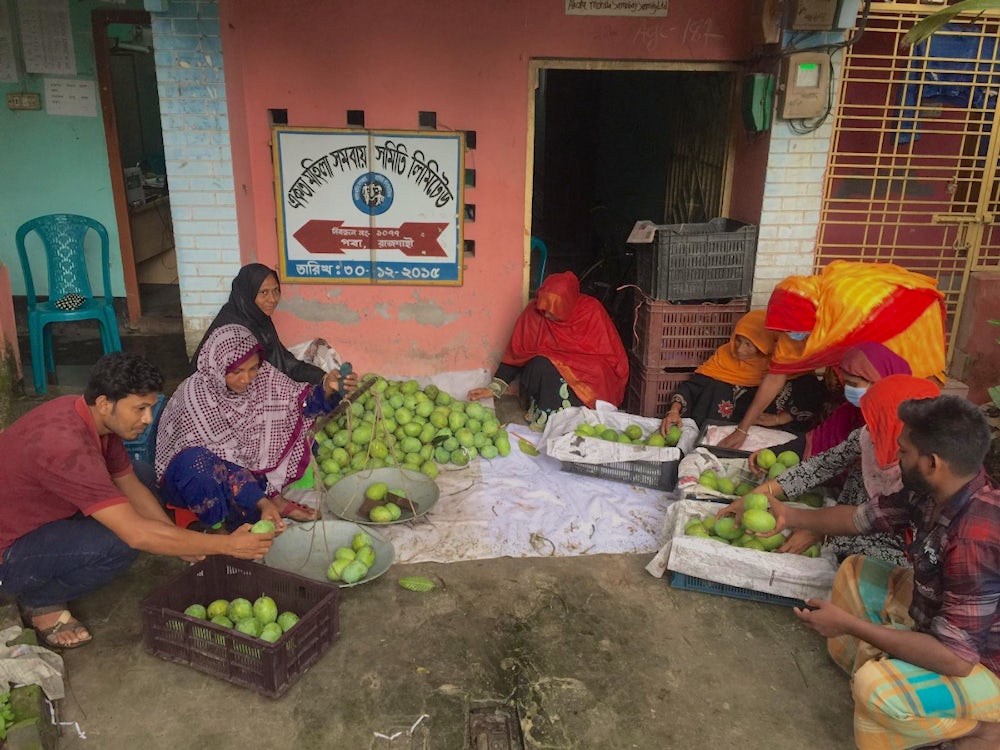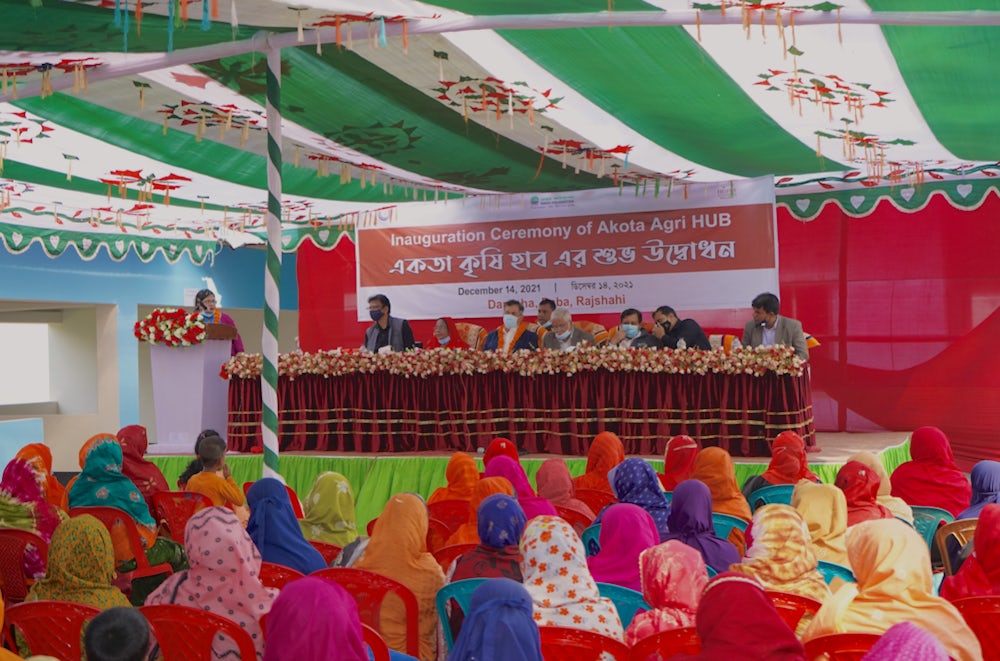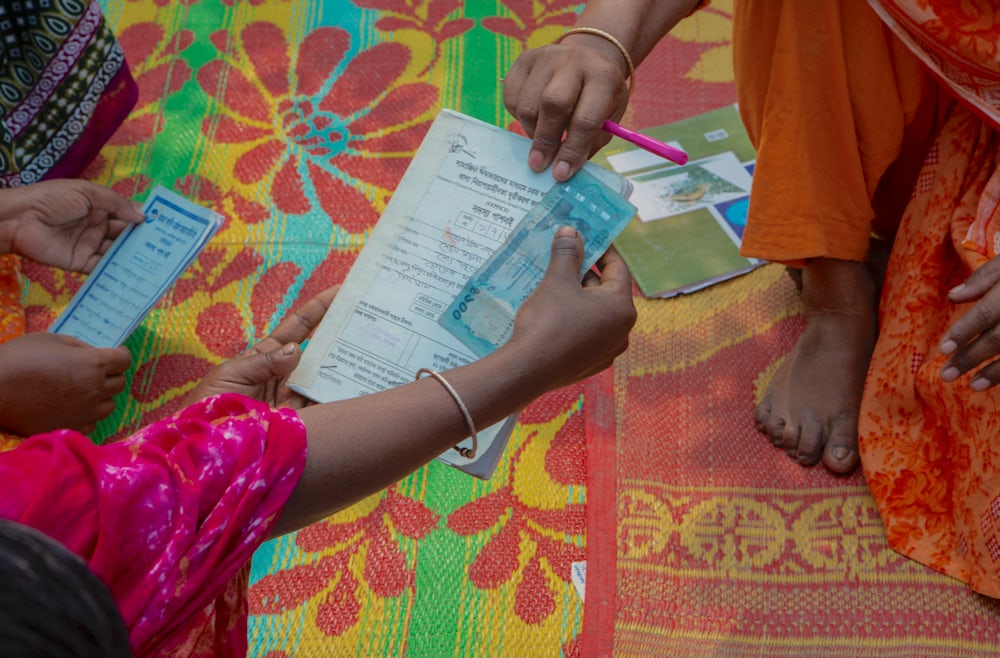In the summer, when green mangoes blush yellow and orange, rural farmers in Bangladesh know the growing work might be over; but the work of finding a buyer and earning a fair price for their sought-after fruit has just begun.
This journey from farm to table is long and full of middlemen.
Many smallholder producers sell to individual buyers who then sell to wholesalers for distribution to local markets. But this process, compounded by the fact that fresh fruits and vegetables have limited time before they turn from ripe to rotten, means farmers often feel forced to accept unfairly low prices.

In Bangladesh’s western city of Rajshahi, a Heifer-supported agricultural cooperative is changing this reality.
The Akota Women’s Cooperative Limited, which formed in 2015 and has over 350 members, pivoted to selling their mangoes online when the pandemic shuttered markets — mangoes they grow free from chemical pesticides. And now, the women have successfully built and begun operating an aggregation site: the Akota Agrihub.
“Earlier, I had to go long distances to sell my products,” said Kajol Begum, an Akota Cooperative member, who grows potatoes and tomatoes. “Now I can sell my produce at Akota Agrihub, which is nearby my home. It saves me time, energy and transportation costs.”
Sitting on over 7,000 square feet of land purchased from the cooperative's own funds, the hub serves as a one-stop shop for local farmers. Not only can producers aggregate and collectively market their goods to local buyers, but the building also contains an input shop, where farmers can access technical information and critical supplies like seeds, livestock medication and fertilizer.
“Earlier, I had to go long distances to sell my products. Now I can sell my produce at Akota Agrihub, which is nearby my home. It saves me time, energy and transportation costs.” — Kajol Begum
Strengthening farmers’ stake in the food system and maximizing the profits they earn is especially important in Bangladesh, where 87% of rural households derive at least some of their income from agriculture. Heifer believes that building strong market systems that respect the farmers at their center is key to supporting rural communities and lifting families out of poverty — and market infrastructure like the Akota Agrihub are a critical component of this work.

Aggregation centers are similar to a market for bulk goods. They allow cooperative members to collect, store and market their produce in one location, creating a large and consistent supply of locally-grown goods to better meet market demands. The hub also allows for the timely marketing and sale of harvest to interested buyers, reducing waste and improving smallholders’ access to market actors, who in turn benefit from access to a larger quantity of produce.
“The warehouse will create a great opportunity for farmers to aggregate and sell their products at fair prices,” said Arzia Begum, president of the Akota Women’s Cooperative. “Their incomes will increase.”
And so far, it’s working.
Six months since the hub opened in December 2021, cooperative members have aggregated and sold over 11,200 pounds, or 5,100 kg, of fruits and vegetables to local traders — including tomatoes, beans, cabbage, a variety of gourds, papayas, onions and bananas. That’s a significant quantity for smallholder farmers in Bangladesh, who often struggle to earn a Sustainable Living Income to afford basic needs.

“Heifer International is transforming cooperatives into functional business hubs and sustainable institutions where all cooperative members will get necessary support services,” said Neena Joshi, Heifer’s senior director of programs in cooperative development.
“The agrihub will create an opportunity for cooperative members and community people to aggregate and market their products and the cooperative will play a significant role to reduce poverty by empowering women,” she said.
The Akota Agrihub is proving that women-owned and -operated businesses can be profitable. Heifer Bangladesh is scaling up this effort by supporting the construction of eight more agrihubs to serve ten cooperatives across four districts. Six hubs are already complete and two are under construction.
Now, when their mangoes change color, the women of Akota know where to find dependable buyers. And though they arrive at the hub with fresh harvests, they depart with more than money in their pockets; they leave with the knowledge of sustainable prosperity, solidarity with their fellow farmers, and a future ripe with the promise of fair pay for the fruits of their labor.